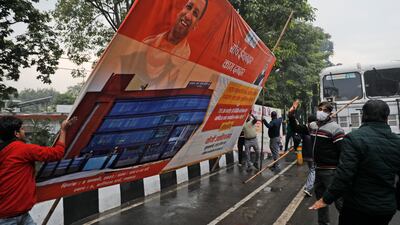Live updates: follow the latest news on Covid-19 variant Omicron
Indian authorities have imposed a ban on all election campaigns after facing criticism over political parties holding large gatherings despite a surge in coronavirus infections.
The Election Commission of India on Saturday announced the dates for staggered assembly elections in five states, beginning on February 10, asking parties to campaign online as Omicron cases increase.
Chief election commissioner Sushil Chandra said the poll body decided to put on hold all election campaigns until next week after invoking the “model code of conduct” − a set of guidelines followed by political parties.
“The decision to go ahead [with the election] was taken after much discussion. The situation is very dynamic,” Mr Chandra said. “No roadshows, padyatras [marches], cycle or bike rallies and processions shall be allowed until January 15.”
The situation would be reviewed and new instructions may be issued, he said.
Mr Chandra advised political parties to conduct campaigns through “digital, virtual, mobile and media platforms instead of physical mode ensuring strict compliance of Covid safety norms.”
The ban comes after the country confirmed more than 159,000 new infections on Sunday — a three-fold increase in the past week.
More than 325 deaths were also recorded in the 24-hour reporting period.
India’s caseload now stands at 35 million, with 483,790 deaths since the pandemic began in 2020.
Despite the rising number of cases blamed on the highly transmissible variant after the first case of Omicron was detected on December 2, leaders and ministers across political parties had been holding enormous rallies in poll-bound states.
Prime minister Narendra Modi hosted a series of rallies attended by tens of thousands of people in northern Uttar Pradesh, the most populous state currently ruled by his Bharatiya Janata Party, which is fighting for a second term.
The gatherings had stoked fears of a repeat of the brutal second wave in April last year, which came as politicians including Mr Modi mobilised tens of thousands of people to attend rallies.
The commission came under heavy criticism for allowing eight-phase elections and rallies in April and May as India was grappling with the Delta-driven second wave.
The Madras High Court had then blamed the election commission for the surge in infections and called for its officials to be tried for murder.
In December, Allahabad High Court in Uttar Pradesh state had urged the prime minister to postpone the elections and ban political rallies after several health experts voiced concerns over minimal social distancing at such gatherings.
India begins Covid-19 vaccination drive for teenagers – in pictures
Internet users criticised the election commission for not banning the large rallies even as the federal health ministry had warned of an impending third wave.
Many states have introduced night curfews and weekend lockdowns, banning social gatherings and limiting the number of people at weddings and funerals.
On Sunday, the western Maharashtra state imposed new measures, closing down swimming pools, spas, beauty salons and zoos and restricting the number of people in groups to five in an attempt to contain the rising number of cases.
The state has recorded more than 41,000 new cases and 13 deaths in the past 24 hours.
The capital Delhi crossed the 20,000-mark on Sunday while the test positivity rate rose to 19 per cent from one per cent last month.












